|
|
|
Sort Order |
|
|
|
Items / Page
|
|
|
|
|
|
|
| Srl | Item |
| 1 |
ID:
114100


|
|
|
|
|
| Publication |
2012.
|
| Summary/Abstract |
?Summary? 40 years, the question of dialogue between China and the United States have been covered from the political security to the economic and trade cooperation, of climate change science, education, land, sea, air, space, the virtual world to the network a wide range of areas. This fully reflects the profound changes in the international situation, it reflects the interests of China and the United States increasingly intertwined, reflects the connotation of Sino-US relations continue to enrich and expand. Need to strengthen strategic mutual trust between China and the United States need to learn more about each other's concerns and needs, you need to look for more global cooperation in the field of create more cooperation highlights.
|
|
|
|
|
|
|
|
|
|
|
|
|
|
|
|
| 2 |
ID:
104675
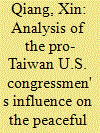

|
|
|
| 3 |
ID:
131116


|
|
|
|
|
| Publication |
2014.
|
| Summary/Abstract |
Thanks to joint efforts of successive leaders and the people of both countries, China-US relations in the past 35 years have achieved historic growth, which is a source of inspiration for us. China-US relations have today reached a new historical starting point. So long as China and the United States move forward together in the direction set by our presidents and take concrete actions, the great vision of building a new model of major-country relations between China and the United States can surely be realized.
|
|
|
|
|
|
|
|
|
|
|
|
|
|
|
|
| 4 |
ID:
128817
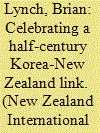

|
|
|
| 5 |
ID:
111558


|
|
|
|
|
| Publication |
2011.
|
| Summary/Abstract |
Global governance involves worldwide redistribution of power, wealth and resources. The sole super power and other powers are focusing on the struggle between unipolarity and multipolarity. Traditional powers and emerging powers are competing against each other for power and interests. And there are ongoing conflicts among western countries and fragmentation in the developing world. China-U.S. relationship is particularly complicated, multi-faceted and ever changing. But different from its relations with the U.S., China has no direct geopolitical conflict of interests or outstanding issues left over from history in its relations with Europe. China and Europe now share increasing interests in addressing major international issues, and pursue the same or similar goals and concepts in upholding world peace and stability, in seeking to resolve international disputes through peaceful means and in reforming the international financial system. This has created broad space for China-Europe cooperation in global governance.
|
|
|
|
|
|
|
|
|
|
|
|
|
|
|
|
| 6 |
ID:
123574


|
|
|
| 7 |
ID:
155835
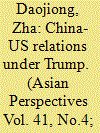

|
|
|
| 8 |
ID:
089144
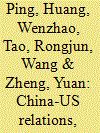

|
|
|
|
|
| Publication |
2009.
|
| Summary/Abstract |
The China-US relationship is one of the most important bilateral relationships in the world, and it is progressively maturing. Non-traditional security threats are expanding the shared interests of China and the US. The two countries have developed more realistic views of each other than they had decades ago, and this is making military relations more practical. The two are also interdependent in the economic realm, whether they like it or not, and therefore must work together to succeed in handling the current economic crisis. Connected to this economic challenge is that of climate change, an issue which the US must handle wisely in its relations with China. In addition, traditional security and peace issues will remain important, some even sensitive and difficult, in relations in the near future. The improved relationship towards which China and the US are moving will contribute substantially not only to bilateral relations but also to global peace and order.
|
|
|
|
|
|
|
|
|
|
|
|
|
|
|
|
| 9 |
ID:
097380
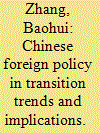

|
|
|
| 10 |
ID:
112830


|
|
|
|
|
| Publication |
2012.
|
| Summary/Abstract |
Since the mid-1990s, China's navy has witnessed remarkable progress in force-projection capability build-up which has enabled it to move from coastal waters to the deep oceans. The continuing naval modernization process has aroused deep-rooted suspicions and two prevailing assumptions that these new capabilities will be used to challenge US maritime dominance and to fulfill national reunification of Taiwan. This article examines the validity of the hypotheses and points out that China has neither the intention nor the capabilities to pursue these objectives. By referring to the priority on China's defense agenda and imminent threat identification, this article suggests that naval modernization will enhance China's capabilities to contribute to global commons, including protection of sea lanes of communications and addressing nontraditional security threats, which will provide new opportunities and dynamics for China-US cooperation, rather than for confrontation.
|
|
|
|
|
|
|
|
|
|
|
|
|
|
|
|
| 11 |
ID:
175888
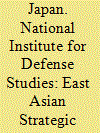

|
|
|
|
|
| Publication |
Tokyo, National Institute For Defense Studies, 2020.
|
| Description |
x, 217p.Pbk
|
| Standard Number |
9784864820844
|
|
|
|
|
|
|
|
|
|
|
|
Copies: C:1/I:0,R:0,Q:0
Circulation
| Accession# | Call# | Current Location | Status | Policy | Location |
| 059919 | 355.0095/JAP 059919 | Main | On Shelf | General | |
|
|
|
|
| 12 |
ID:
137445
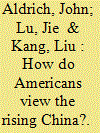

|
|
|
|
|
| Summary/Abstract |
The dramatic increase in China's economic and hence political power and influence is a common story around the world. Just how clearly and well does this story get across to citizens of some nations other than China, itself? In particular, we ask what Americans know about China. Do they observe its rise? Are their views simple or rich and nuanced? How do they vary across the public? What leads to more positive and what leads to more negative views of China? We report the results of a survey of the American population designed to address these questions. We find that they are reasonably knowledgeable of China's rise and that they have rich and nuanced perceptions of a variety of dimensions of China, its society, economy and polity. These views are, on balance, not especially positive, but the more cosmopolitan the citizen, the more likely they are to hold positive views. Those who are Democrats, who are liberals, and who have had the opportunity to travel in China are especially likely to have positive impressions.
|
|
|
|
|
|
|
|
|
|
|
|
|
|
|
|
| 13 |
ID:
114102


|
|
|
| 14 |
ID:
186170
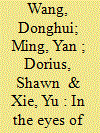

|
|
|
|
|
| Summary/Abstract |
With China–U.S. relations becoming simultaneously more integrated and complex, it is all the more important to understand the nature and determinants of reciprocal perceptions between Chinese and American publics. Using nationally representative, bi-national public opinion surveys, this article compares the attitudes of Chinese toward the U.S. with those of Americans toward China. The article gives primary attention to generalized attitudes toward each country but also studies domain-specific attitudes. The results suggest that Chinese hold more-favorable attitudes toward the U.S. than do Americans toward China. Chinese and Americans also differ on domain-specific issues. Chinese place greater importance on sovereignty issues and territorial disputes, while Americans give greater attention to universal values such as human rights and environmental degradation.
|
|
|
|
|
|
|
|
|
|
|
|
|
|
|
|
| 15 |
ID:
132399
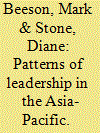

|
|
|
|
|
| Publication |
2014.
|
| Summary/Abstract |
Leadership at the regional level has come under the spotlight not only in the post-Cold War context, but also more recently following the global financial crisis. Yet, leadership by states within region-building and regional associations as leaders vis-à-vis other regions or powers remains relatively new territory for analysis and consideration, even though the Association of Southeast Asian Nations (ASEAN) has attracted both admirers and sceptics. This introductory essay is intended to achieve two principal objectives regarding this symposium addressing Asia-Pacific regional leadership. First, we seek to put the 'Asia-Pacific' in historical context and identify some of the forces that have not only shaped but also hindered its realization. Recognizing China's historical role and contemporary rise is important to understand the parameters within which ASEAN and its member states seek to define particular visions of regional identity and enact collective enterprises. The other key background consideration when thinking about contemporary leadership in the Asia-Pacific is that the United States is seemingly in decline. The Asia-Pacific's two most consequential powers - the United States and China - are pervasive considerations for any regional organization that aims to lead and promote cooperation to solve collective action problems.
|
|
|
|
|
|
|
|
|
|
|
|
|
|
|
|
| 16 |
ID:
120522


|
|
|
| 17 |
ID:
130469
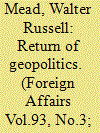

|
|
|
|
|
| Publication |
2014.
|
| Summary/Abstract |
So far, the year 2014 has been a tumultuous one, as geopolitical rivalries have stormed back to center stage. Whether it is Russian forces seizing Crimea, China making aggressive claims in its coastal waters, Japan responding with an increasingly assertive strategy of its own, or Iran trying to use its alliances with Syria and Hezbollah to dominate the Middle East, old-fashioned power plays are back in international relations. The United States and the EU, at least, find such trends disturbing. Both would rather move past geopolitical questions of territory and military power and focus instead on ones of world order and global governance: trade liberalization, nuclear nonproliferation, human rights, the rule of law, climate change, and so on. Indeed, since the end of the Cold War, the most important objective of U.S. and EU foreign policy has been to shift international relations away from zero-sum issues toward win-win ones. To be dragged back into old-school contests such as that in Ukraine doesn't just divert time and energy away from those important questions; it also changes the character of international politics. As the atmosphere turns dark, the task of promoting and maintaining world order grows more daunting. But Westerners should never have expected old-fashioned geopolitics to go away. They did so only because they fundamentally misread what the collapse of the Soviet Union meant: the ideological triumph of liberal capitalist democracy over communism, not the obsolescence of hard power. China, Iran, and Russia never bought into the geopolitical settlement that followed the Cold War, and they are making increasingly forceful attempts to overturn it. That process will not be peaceful, and whether or not the revisionists succeed, their efforts have already shaken the balance of power and changed the dynamics of international politics.
|
|
|
|
|
|
|
|
|
|
|
|
|
|
|
|
| 18 |
ID:
112831


|
|
|
|
|
| Publication |
2012.
|
| Summary/Abstract |
The China-US relationship is a multidimensional complex one involving both traditional and nontraditional security issues. However, nontraditional security issues (NTS) have become paramount in reshaping Sino-US relations, though there is no absolute boundary between NTS and traditional security. With both traditional security issues and NTS issues being solved according to the involved nations' prior experience in dealing with traditional security matters, it stands to reason that there is a very fine line, if that, between NTS and traditional security and that they are not necessarily mutually exclusive. Although the energy threat is more likely to be considered a traditional security matter than concerns such as the terrorism threat or climate change issue, the energy threat actually contains some NTS characteristics, like how to get full use of natural resources and the relevance with climate change. This article, to some extent, explains the dynamic between traditional and nontraditional security through the case study of China-US relations.
|
|
|
|
|
|
|
|
|
|
|
|
|
|
|
|
| 19 |
ID:
104332


|
|
|
|
|
| Publication |
2011.
|
| Summary/Abstract |
On 8 March 2009, five Chinese vessels shadowed and aggressively maneuvered in close proximity to the US Naval Ship (USNS) Impeccable. This paper seeks to explain the incident and its aftermath in the context of Chinese coercive diplomacy. China's strategy, designed to motivate the US to cease surveillance operations near its militarily sensitive areas in the South China Sea, included three components: (1) the use of military provocation, (2) a coordinated media campaign, and (3) a challenge to US interpretations of the United Nations Convention on the Law of the Seas (UNCLOS). This study goes beyond traditional research on Chinese use of force to explain why China's coercive diplomatic campaign took the form it did. Only by understanding the nature and factors affecting Chinese coercive diplomacy can the US design the effective counter strategy needed to protect US regional and global interests.
|
|
|
|
|
|
|
|
|
|
|
|
|
|
|
|
| 20 |
ID:
131593
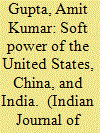

|
|
|
|
|
| Publication |
2013.
|
| Summary/Abstract |
As countries compete for dominance in International Politics, soft power has emerged as a major tool for nation states to ensure enhancement of their intangible standing, besides strengthening their in?uence in a benign way. The United States, China and India are considered prime examples in the ?eld of soft power, though the nature, intent, and fruition of soft power vary in each case. This article attempts to highlight and analyze the diverse nature of soft power that these countries possess, and illuminate as to how di?etently they have used their soft power resources. And ?nally an attempt has been made to put forward a case that each of these countries presents itself as an archetype-- they may learn from each other's successes and missteps in the domain of soft power.
|
|
|
|
|
|
|
|
|
|
|
|
|
|
|
|
|
|
|
|
|